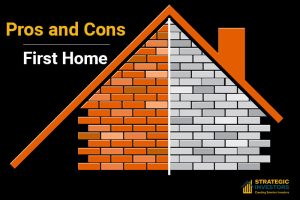
The journey to homeownership is a dream for many, but what if there was an alternative path that could potentially lead to greater financial rewards and lifestyle flexibility? Buying investment property as the first home may seem unconventional, but it can be a viable and lucrative option for those willing to think outside the box. Instead of following the traditional route of purchasing a primary residence, imagine building wealth and equity through property investment while enjoying the freedom to live in your preferred location.
In this blog post, we will delve into the pros and cons of purchasing an investment property as your first home, discuss how to evaluate your personal situation and provide key factors to consider when making this crucial decision. By the end, you will be armed with the knowledge and confidence to determine if buying an investment property as your first home is the right choice for your unique circumstances and long-term goals.
Key Takeaways
- Investing in property as a first home entails risks, but also potential financial benefits. Careful research and planning are needed to weigh the pros and cons.
- Location, property type & condition, and financing options should be taken into account when purchasing an investment property.
- Research, professional advice, and ongoing management are essential components of successful investing for first-time homebuyers.
The Pros and Cons of Buying an Investment Property as Your First Home
 The decision to buy an investment property as your first home comes with its unique set of advantages and challenges. On one hand, it presents exciting financial benefits such as rental income, capital growth, and tax deductions. Additionally, it offers lifestyle flexibility, allowing you to rent in a desirable area while building equity in a more affordable property.
The decision to buy an investment property as your first home comes with its unique set of advantages and challenges. On one hand, it presents exciting financial benefits such as rental income, capital growth, and tax deductions. Additionally, it offers lifestyle flexibility, allowing you to rent in a desirable area while building equity in a more affordable property.
On the other hand, this strategy comes with risk factors such as market volatility, vacancy rates, and higher interest rates on investment loans. So, how do you weigh these pros and cons against the stability and security of owning your own home? The answer lies in understanding the nuances of purchasing an investment property and evaluating your personal situation to determine if this unconventional approach aligns with your long-term goals.
Financial Benefits
One of the most attractive aspects of buying an investment property as your first home is the potential for financial benefits. Rental income can help offset mortgage repayments, property management expenses, and tax implications. Additionally, capital growth can be a significant advantage, especially if your ultimate goal is to purchase your dream home in the future.
It’s important to conduct thorough research to select a property with promising capital gains and high rental returns. Calculating the anticipated cash flow, taking into account expenses such as:
- mortgage repayments
- utilities
- taxes
- maintenance
This will ensure you make a sound investment decision.
Furthermore, understanding the tax advantages of leasing an investment property, such as depreciation and negative gearing, can help maximize your returns.
Lifestyle Flexibility
Choosing to buy an investment property as your first home also offers unparalleled lifestyle flexibility. This strategy allows you to rent in a more desirable location while building equity in a more affordable property. In other words, you can enjoy the benefits of living in an area with great amenities and lifestyle options without committing to a hefty mortgage.
This approach, known as “rentvesting”, enables you to adapt your living arrangements to suit your personal and financial circumstances at any given time. Whether you need to relocate for work, or simply want to experience living in different areas, renting in your preferred location while owning an investment property provides the best of both worlds.
Risk Factors
Despite the potential benefits, buying an investment property as your first home also comes with its share of risks. Some of these risks include:
- Market fluctuations can impact house prices, affecting property values
- Changes in rental demand can lead to periods of vacancy
- Investment loans typically carry higher interest rates due to the perceived higher risk of default
It’s important to carefully consider these risks before making a decision to buy an investment property as your first home.
Mitigating these risks requires informed decisions grounded in comprehensive research and meticulous planning. Understanding the local property market, seeking professional advice, and staying updated on property trends can help you navigate the challenges of investing in property and ultimately achieve your long-term goals.
Evaluating Your Personal Situation
 Deciding between buying an investment property or a family home as your first property necessitates a thorough evaluation of your personal situation. Factors such as affordability, the balance between stability and flexibility, and long-term objectives should be carefully considered.
Deciding between buying an investment property or a family home as your first property necessitates a thorough evaluation of your personal situation. Factors such as affordability, the balance between stability and flexibility, and long-term objectives should be carefully considered.
By taking the time to assess your financial situation, personal circumstances, and lifestyle preferences, you can make an informed decision on whether buying an investment property as your first home is the right choice for you.
Affordability
One of the key factors to consider when evaluating your personal situation is affordability. Purchasing an investment property requires a thorough understanding of your current financial situation, long-term goals, and ability to cover mortgage repayments and other expenses.
When assessing the property price, consider the current market value of the property, the possibility of capital growth, and the potential rental income. Moreover, assessing potential tax implications linked to owning an investment property, such as deductions, capital gains tax, and potential tax benefits, is of paramount importance.
By taking all these factors into account, you can determine if purchasing an investment property is a financially viable option for you.
Stability vs. Flexibility
Another important aspect of evaluating your personal situation is determining whether you value stability and security in homeownership or flexibility in living arrangements and investment opportunities. Stability in homeownership denotes the assurance of having a set mortgage payment and a long-term investment, while flexibility in living arrangements and investment prospects indicates the capacity to act promptly and capitalize on short-term opportunities.
By assessing your individual circumstances and preferences, you can decide whether the stability of owning a family home or the flexibility of owning an investment property better aligns with your long-term goals and lifestyle.
Long-term Goals
Your long-term objectives should encompass wealth accumulation, retirement preparation, and lifestyle choices. In order to make an informed decision about purchasing an investment property as your first home, it is important to consider how this decision aligns with your long-term goals.
Consider the following aspects when deciding to purchase an investment property:
- Affordability
- Location
- Property type and condition
- Financing options
By weighing these factors against your long-term objectives, you can determine if purchasing an investment property is the appropriate decision for you.
Key Factors to Consider When Purchasing an Investment Property
 Now that you have evaluated your personal situation and weighed the pros and cons of buying an investment property as your first home, it is time to delve into the key factors to consider when making this crucial decision. These factors include location, property type and condition, and financing options.
Now that you have evaluated your personal situation and weighed the pros and cons of buying an investment property as your first home, it is time to delve into the key factors to consider when making this crucial decision. These factors include location, property type and condition, and financing options.
Considering these factors will help you make optimal choices tailored to your unique circumstances and long-term goals.
Location
Location is of paramount importance with regard to rental demand, capital growth potential, and overall investment success. When selecting the location of an investment property, it is imperative to conduct research on:
- Local market trends
- Demographics
- Potential for capital growth
- Potential for rental income
A well-chosen location can significantly impact the success of your investment property. Choosing an area with strong demand and promising capital growth prospects sets the stage for long-term success in property investing.
Property Type and Condition
The type, size, and condition of the property you choose to invest in can greatly influence your rental yield and maintenance costs. It is advisable to avoid properties that are poorly-maintained or have limited growth potential, as these can negatively impact your investment’s performance.
A careful assessment of the property’s type, size, and condition ensures a sound investment decision in line with your long-term goals and financial situation.
Financing Options
In order to purchase investment properties, it is crucial to investigate all available financing options and ascertain which one is most suitable for your financial circumstances, investment objectives, and loan repayments. Financing options such as investment loans and government incentives can play a significant role in the overall success of your investment property.
By exploring various financing options and seeking professional advice, you can make an informed decision about the best financing option for your unique situation and ensure the long-term success of your investment property.
Navigating First-Time Homebuyer Incentives and Regulations
 As a first-time homebuyer, it is essential to be aware of the incentives and regulations that may apply to your investment property purchase. Understanding grant eligibility and tax implications can help you make the most of your investment and ensure that you are compliant with all relevant regulations.
As a first-time homebuyer, it is essential to be aware of the incentives and regulations that may apply to your investment property purchase. Understanding grant eligibility and tax implications can help you make the most of your investment and ensure that you are compliant with all relevant regulations.
This section covers grant eligibility and tax implications, equipping you with the knowledge and tools to navigate the complex world of first-time homebuyer incentives and regulations.
Grant Eligibility
First-time home buyers may be eligible for grants and concessions that can help reduce the deposit amount and overall costs. However, it is important to note that investors are generally not eligible for a First Home Owner Grant when purchasing an investment property.
Though there may be certain exceptions where the grant may be claimed, it is crucial to review the applicable eligibility requirements as per the regulations of your state or territory. Establishing your eligibility for first home buyer grants and concessions could potentially lead to considerable savings on your investment property purchase.
Tax Implications
When purchasing an investment property, it is vital to understand the tax implications associated with owning such a property. These may include deductions for mortgage interest, property taxes, and other expenses related to the maintenance of the property.
To ensure that you are maximizing the potential tax benefits of your investment property, it is recommended to consult a tax professional. They can provide you with expert advice on the deductions, credits, and liabilities that may apply to your specific situation.
Tips for Success in Property Investing as a First-Time Homebuyer
 Embarking on the journey of property investing as a first-time homebuyer can be both exciting and daunting. However, by following certain tips and strategies, you can maximize your chances of success and build a solid foundation for future investments.
Embarking on the journey of property investing as a first-time homebuyer can be both exciting and daunting. However, by following certain tips and strategies, you can maximize your chances of success and build a solid foundation for future investments.
This final section shares valuable tips for success in property investing as a first-time homebuyer, encompassing research and planning, professional advice, and ongoing management.
Research and Planning
 The foundation of any successful property investment is thorough research and planning. By staying informed about market trends, property values, and potential investment opportunities, you can make informed decisions and minimize the risks associated with investing in property.
The foundation of any successful property investment is thorough research and planning. By staying informed about market trends, property values, and potential investment opportunities, you can make informed decisions and minimize the risks associated with investing in property.
Utilize online resources such as real estate websites, local newspapers, and property market reports to research the local market and identify potential investment opportunities. Additionally, engage in conversations with local real estate agents and property investors to gain further insights into the market and potential investments.
Professional Advice
Seeking professional advice from real estate agents, financial advisors, and property managers is crucial in ensuring that you are making the best choices for your investment goals. These professionals can provide valuable insights and guidance on everything from market trends and property values to financing options and tax implications.
Consulting with qualified professionals helps in making informed decisions that align with your long-term goals and financial situation.
Ongoing Management
Lastly, implementing effective property management strategies is crucial to maximizing your investment’s potential. This may include hiring a property manager to oversee the daily operations of your rental property or staying organized with maintenance and tenant relations.
Staying abreast of your property’s management ensures your investment’s continued growth and solid returns over time.
Guest Experience
Delivering an exceptional guest experience is key to maintaining high occupancy rates and garnering positive reviews for your Airbnb investment. Focus on offering quality amenities, maintaining a clean and well-maintained property, and providing responsive communication with your guests.
Remember that your guests’ experience starts from the moment they view your listing online. Ensure your property is accurately represented through high-quality photos and a detailed description of the amenities and features. By prioritizing guest experience, you can build a positive reputation for your Airbnb property, attract more bookings, and ultimately generate higher rental income.
Property Management Solutions
Managing an Airbnb investment can be time-consuming and challenging, especially for first-time hosts. Property management solutions can help streamline the management process, either through self-management or hiring professional services.
For those who prefer to self-manage their Airbnb property, consider using property management software to automate tasks such as bookings, guest communication, and maintenance scheduling. Alternatively, hiring a professional property manager can save you time and effort, allowing you to focus on other aspects of your investment.
No matter the management approach you adopt, staying organized and proactively addressing any issues during your guests’ stay is imperative.
Summary
Purchasing an investment property as your first home can be a rewarding and financially lucrative decision for those willing to think outside the box. By weighing the pros and cons, evaluating your personal situation, and considering key factors such as location, property type and condition, and financing options, you can make an informed decision about whether this unconventional approach is right for you.
Remember, the key to success in property investing lies in thorough research, planning, seeking professional advice, and ongoing management. With these strategies in place, you can embark on the exciting journey of property investing as a first-time homebuyer and build a solid foundation for your future investments.
Frequently Asked Questions

Is it better to get an investment property first?
Given the current market conditions, it is definitely beneficial to purchase an investment property first. This can enable first-home buyers to find an affordable investment property that suits their needs, thus providing them with greater purchasing power.
By investing in a property, buyers can benefit from the potential capital growth and rental income that comes with owning a property. This can help them build a strong financial foundation.
What is the 1% rule in property investing?
The 1% rule is a metric used to measure the potential return of an investment property. It states that the monthly rent should equal or exceed 1% of the purchase price plus necessary repairs.
To maximize return, investors should seek mortgage loans with payments lower than the 1% figure.
How much money should I have before buying investment property?
For a successful investment property purchase, you should have 20% of the purchase price saved as a deposit, plus an additional amount for stamp duty and legal fees.
This will help you avoid having to pay a lender’s mortgage insurance (LMI).
What type of property is best for first investment?
Investing in apartments can be a great option for first investments, as they are typically cheaper in their initial price and produce higher rental yields than established houses.
This makes it easier to purchase and manage repayment costs.
What are the financial advantages of purchasing an investment property as my first home?
Purchasing an investment property as your first home offers great financial benefits, such as rental income, capital growth, and tax deductions, though it may require a larger initial cash investment.













